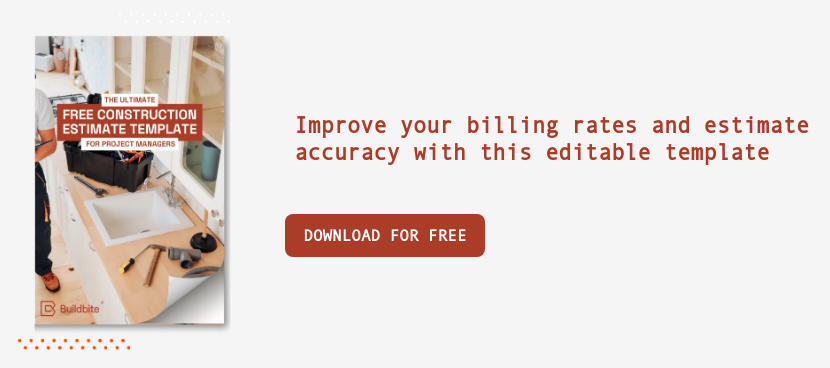Anyone in the construction industry from brick layers to CEOs knows that estimating construction costs is crucial to the success of a project.
Whether it's a residential home or a commercial complex, construction cost estimates serve as the foundation for effective budgeting and project management. In this article, we'll delve into the intricacies of calculating construction cost estimates using software and templates, addressing key questions to help you navigate this critical aspect of the construction process.
How Can You Calculate Your Construction Cost Estimate?
A construction cost estimate is a comprehensive assessment of the expenses involved in a construction project before it begins, and is an essential step in the preconstruction process. Vital both for client satisfaction and completing a profitable project, this estimate should include everything from labor costs, material costs, equipment costs, subcontractor fees, and overheads.
While this part of the project often seems daunting at first, starting with a clear process helps smoothen the steps:
-
Gather Project Information: Begin by gathering all relevant project details, such as architectural and engineering plans, specifications, and materials.
- Utilize specialized construction estimating software to create a template. This template will include line items for different project components, allowing you to break down the costs and produce clear estimates that clients and stakeholders can follow from the start.
-
Create a Detailed Template: Utilize specialized construction estimating software to create a template. This template will include line items for different project components, allowing you to break down the costs. (You can do this manually, but the software will save you a lot of time and stress).
-
Break Down the Project: Divide the project into various phases like excavation, foundation, electrical, plumbing, and finishes. Each phase should have its own line item in your template.
-
Input Quantities: Enter the quantities required for each phase. For example, in the excavation section, you would input the volume of earth to be moved.
-
Input Unit Costs: Add unit costs for labor, materials, equipment, and subcontractor services. These costs can be based on historical data, supplier quotes, or industry averages. The more data, the better.
-
Calculate Totals: Unless you’ve decided to work manually, let the software calculate the total cost for each phase based on the quantities and unit costs you've provided.
-
Include Contingency: After one or two projects, you’ll know how important it is to add a contingency amount! This is typically a percentage of the total cost and accounts for unforeseen expenses, price fluctuations, or just plain bad luck.
-
Review and Adjust: Carefully review your estimate, ensuring you haven't missed any costs or components. Make adjustments as needed.
-
Save and Store Data: Save the estimate data for future reference and use it in the project management phase.
-
Monitor Updates: Keep your estimate updated throughout the project as costs and quantities may change.
Sticking to a structured plan and maintaining the process will not only help your project run more smoothly but also ensure you have more consistent estimating methods in construction across all projects.
While this can be done manually, using software such as Buildbite to manage and streamline projects more effectively is the best way to save time and reduce mistakes from human error.

Which Factors Influence Your Construction Cost Estimate The Most?
A lot of different things will influence the accuracy of your construction cost estimate, but some have more influence than others. To make sure you have a successful project, these are the factors to look out for:
- Change requests
- One of the biggest cost variables in a project. It’s important to track change requests and align on how they should be handled at the beginning of a project. Since they can have a big impact on costs.
- Inadequate data
- Market fluctuations
- Unforeseen conditions
- Estimating expertise
According to a survey conducted by Software Advice, one of the biggest budgeting challenges that construction professionals face is inaccurate estimates. Being aware of the influencing factors above so you can act accordingly, decreases the risks of inaccurate cost estimates, resulting in more streamlined and accurate budgeting.
Source: Software Advice 2023 Construction Survey
How Does Residential and Commercial Construction Cost Estimates Differ?
Residential and commercial construction projects vary significantly in terms of scale, complexity, and requirements. Residential projects, such as single-family homes, are smaller in scale, leading to differences in material and labor needs, often being much more manageable.
On the other hand, commercial projects often involve specialized materials, complex systems, and extended timelines, resulting in higher costs. If that wasn’t complicated enough, compliance with more extensive building codes in commercial construction can also necessitate additional expenses.
Because of this, unique templates, specialized knowledge, and tools are essential for ensuring accurate residential and commercial construction estimating.
What Common Challenges Will You Face When Creating Your Construction Cost Estimate?
Creating a construction cost estimate is not without its challenges, and there are two key challenges a construction cost estimator may face.
A Lack of Information
You don’t know what you don’t know. One of the biggest challenges in building cost estimating is not having key information easily available.
Incomplete project data often results in estimates that are prone to inaccuracy, as estimators may need to make assumptions, elevating the risk of errors. Estimators with different levels of experience may estimate differently, and a lack of effective communication between the estimator, client, and other stakeholders can lead to mistakes. Some contractors might not be able to hire an estimator and have to do it themselves. In that case, it’s even more important to have direct access to key information from all the team members, ideally from a single source of truth.
Having a transparent process, clear goals, and good documentation are some of the things that can not only impact a construction cost breakdown but also make or break a project as Thomas from Trähus explains in 5 reasons projects fail according to a construction project manager.
A Changing Landscape
Things change. Projects can be long and tough - we know that construction is not for the faint-hearted, and cost estimates are susceptible to disruptions due to various factors.
One of the things to avoid is frequent design changes during the project's planning phase, as these often lead to time and budget overruns, complicating the estimate.
Things like unforeseen site conditions, market fluctuations in material prices, contractor estimates, and labor rates are often out of your hands. All of these can affect estimate accuracy, showing exactly why contingency budgets are so important.
Despite the importance of contingencies, they shouldn’t be overly relied upon. They’re great for variable factors that are out of your control, but the more accurate you can make your estimates based on historical data, the better.
How to Minimize Discrepancies Between Estimates and The Final Project Cost
Discrepancies between the initial construction cost estimate and the final project cost are normal in the construction industry. From design changes and scope modifications, as the project advances to market turmoil, they often result in unaccounted additional costs.
Whether it’s keeping clear two-way lines of communication for everyone involved in the project, ensuring you have a suitable contingency budget, or simply tracking time and costs more efficiently, there are plenty of ways to solve discrepancies.
Almost all of these solutions can be easier to implement at the push of a button.
What Are The Benefits of Using Software For Construction Cost Estimation?
Whether you are looking to more accurately estimate the time of a project or the cost of the project, the name of the game is information. You need to know exactly what’s going on during your construction project.
This is where Buildbite saves you a whole lot of time and a whole lot of stress. With Buildbite you can more easily communicate and collaborate in real-time, allowing you and your team to more accurately gauge the cost of the project.
Through more accurate and streamlined documentation you can gather the data you need on projects more efficiently, helping you create much more accurate construction cost estimates for future projects.
At Buildbite, we offer one app for efficient construction task management. At every stage, Buildbite helps you and your team streamline operations, manage tasks, and collaborate in real time. Download the app to try it out, or schedule a demo if you’d like to learn more.









.webp)

